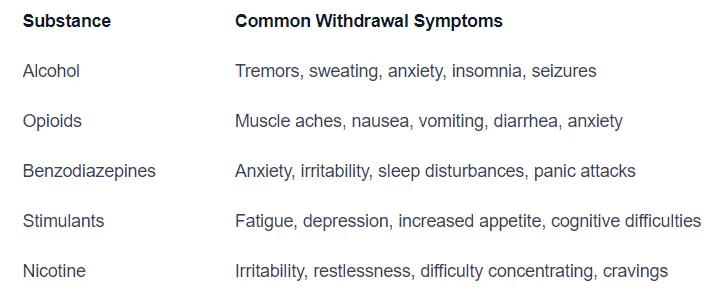Three Common Symptoms of Withdrawal

Understanding Withdrawal
Withdrawal is a physiological and psychological process that occurs when an individual abruptly stops or reduces the use of a substance to which they have developed dependence. It is a common experience for individuals who have been using substances such as drugs or alcohol for an extended period.
What is Withdrawal?
Withdrawal refers to a set of symptoms that occur when the body and brain adjust to the absence or reduction of a substance that it has become accustomed to. These symptoms can vary depending on the substance, the duration and intensity of use, and individual factors.
Withdrawal symptoms can range from mild to severe and may include physical, emotional, and cognitive effects. It is important to note that withdrawal is a natural response of the body and brain as they attempt to regain balance without the presence of the substance.
Common Causes of Withdrawal
Withdrawal can be caused by various substances, including alcohol, opioids, benzodiazepines, stimulants, and nicotine. The severity and duration of withdrawal symptoms can vary depending on the specific substance and the individual's unique circumstances.
Here are some common substances associated with withdrawal symptoms:

It is worth noting that withdrawal symptoms can be both physical and psychological. Physical symptoms tend to be more pronounced in the initial stages of withdrawal, while psychological symptoms may persist for a longer duration.
Importance of Recognizing Withdrawal Symptoms
Recognizing and understanding the symptoms of withdrawal is crucial for several reasons. Firstly, it helps individuals and their loved ones identify when professional help may be necessary. Early recognition of withdrawal symptoms can prompt seeking appropriate medical and psychological support to ensure a safe and effective recovery process.
Furthermore, recognizing withdrawal symptoms can provide validation and understanding for individuals experiencing them. It can help reduce feelings of confusion, shame, or isolation, as they realize that their symptoms are a natural part of the withdrawal process.
By acknowledging and addressing withdrawal symptoms, individuals can take proactive steps toward managing their recovery journey effectively. Seeking professional help, engaging in supportive therapies and techniques, and practicing self-care and healthy coping mechanisms are key components of managing withdrawal symptoms and achieving long-term recovery.
Common Symptoms of Withdrawal
Withdrawal from substances or behaviors can result in a range of uncomfortable symptoms. Recognizing these symptoms is crucial for understanding the challenges individuals face during the recovery process. In this section, we will explore three common symptoms of withdrawal: anxiety and restlessness, physical discomfort and pain, and mood swings and depression.
Symptom 1: Anxiety and Restlessness
Anxiety and restlessness are frequently experienced during the withdrawal process. The sudden absence of substances or behaviors that the body has become dependent on can trigger feelings of unease and agitation. Individuals may find it difficult to relax or concentrate, and may experience racing thoughts or an overwhelming sense of worry.
It's important to note that the severity of anxiety and restlessness can vary depending on the individual and the substance or behavior they are withdrawing from. In some cases, these symptoms may be mild and manageable, while in others, they can be more intense and require additional support.
Symptom 2: Physical Discomfort and Pain
Withdrawal can often manifest physically, with individuals experiencing various forms of discomfort and pain. These physical symptoms can range from mild to severe, depending on the substance or behavior involved.
Physical symptoms of withdrawal may include headaches, body aches, nausea, tremors, sweating, and gastrointestinal distress. These symptoms can make the withdrawal process challenging and may contribute to additional distress and discomfort.
Symptom 3: Mood Swings and Depression
Mood swings and depression are common symptoms experienced during withdrawal. The sudden absence of substances or behaviors that have provided pleasure or relief can lead to a significant shift in mood. Individuals may experience intense sadness, feelings of hopelessness, irritability, and a lack of interest in activities they once enjoyed.
It's important to understand that mood swings and depression during withdrawal are a result of chemical imbalances in the brain. These symptoms can be distressing and may require professional support to manage effectively.
Recognizing these common symptoms of withdrawal is essential for individuals going through the recovery process. Seeking professional help, utilizing supportive therapies and techniques, and practicing self-care and healthy coping mechanisms can all contribute to a smoother and more successful recovery journey.
Managing Withdrawal Symptoms
When faced with the challenging process of withdrawal, it is crucial to develop effective strategies for managing the associated symptoms. Seeking professional help, utilizing supportive therapies and techniques, and practicing self-care are essential components of navigating the road to recovery.
Seeking Professional Help
One of the most important steps in managing withdrawal symptoms is seeking professional help. Healthcare professionals, such as doctors, addiction specialists, and therapists, can provide valuable guidance and support throughout the withdrawal process. They can assess your individual situation, provide personalized treatment plans, and monitor your progress.
Professional help may include medications that alleviate withdrawal symptoms and reduce cravings. These medications are often used as part of a comprehensive treatment approach, such as medication-assisted therapy (MAT). The specific medications prescribed will depend on the substance of abuse and individual needs.
Supportive Therapies and Techniques
Supportive therapies and techniques play a crucial role in managing withdrawal symptoms and promoting long-term recovery. These therapies aim to address the underlying causes of addiction, develop healthy coping mechanisms, and provide emotional support. Some commonly used supportive therapies include:
- Cognitive-behavioral therapy (CBT): This therapy helps individuals identify and modify negative thought patterns and behaviors associated with substance abuse.
- Group therapy: Participating in group therapy sessions allows individuals to share their experiences, gain support from peers, and learn from others facing similar challenges.
- Mindfulness and meditation: These practices promote relaxation, self-awareness, and emotional regulation, which can be beneficial during the withdrawal process.
- Motivational interviewing: This technique helps individuals explore and strengthen their motivation to make positive changes and overcome addiction.
Self-Care and Healthy Coping Mechanisms
Self-care and healthy coping mechanisms are vital aspects of managing withdrawal symptoms. Taking care of your physical and mental well-being can greatly enhance your ability to navigate the challenges of withdrawal. Here are some self-care practices and coping mechanisms that can be helpful:
- Engaging in regular physical exercise: Exercise releases endorphins, reduces stress, and promotes overall well-being.
- Prioritizing sleep: Getting adequate rest and establishing a consistent sleep schedule can improve mood, energy levels, and overall health.
- Practicing stress-reduction techniques: Techniques such as deep breathing, progressive muscle relaxation, and journaling can help reduce stress and anxiety.
- Building a support network: Surrounding yourself with supportive and understanding individuals can provide a sense of belonging and encouragement throughout the withdrawal process.
- Engaging in hobbies and activities: Pursuing activities that bring joy and fulfillment can provide a healthy distraction from withdrawal symptoms and promote a positive mindset.
Remember, managing withdrawal symptoms is a complex process that requires patience, persistence, and professional guidance. By seeking help, utilizing supportive therapies, and practicing self-care, individuals can enhance their chances of successfully overcoming withdrawal and embarking on a path to long-lasting recovery.
Conclusion
Withdrawal is a challenging and often uncomfortable process that individuals may experience when they abruptly stop or reduce their use of a substance to which they have developed dependence. It can be accompanied by physical, emotional, and cognitive symptoms that vary depending on the substance involved and the individual's unique circumstances.
Recognizing and understanding withdrawal symptoms is crucial for individuals going through the recovery process. Seeking professional help, utilizing supportive therapies and techniques, and practicing self-care are all essential components of managing withdrawal symptoms and achieving long-term recovery.
It's important to remember that managing withdrawal symptoms is a complex journey that requires patience, persistence, and professional guidance. However, with the right support and resources in place, individuals can overcome withdrawal and embark on a path toward lasting recovery.
If you or someone you know is experiencing withdrawal symptoms or struggling with addiction, reach out to a healthcare professional or addiction specialist for guidance and support. Remember, there is hope for recovery, and you don't have to face this challenge alone.
